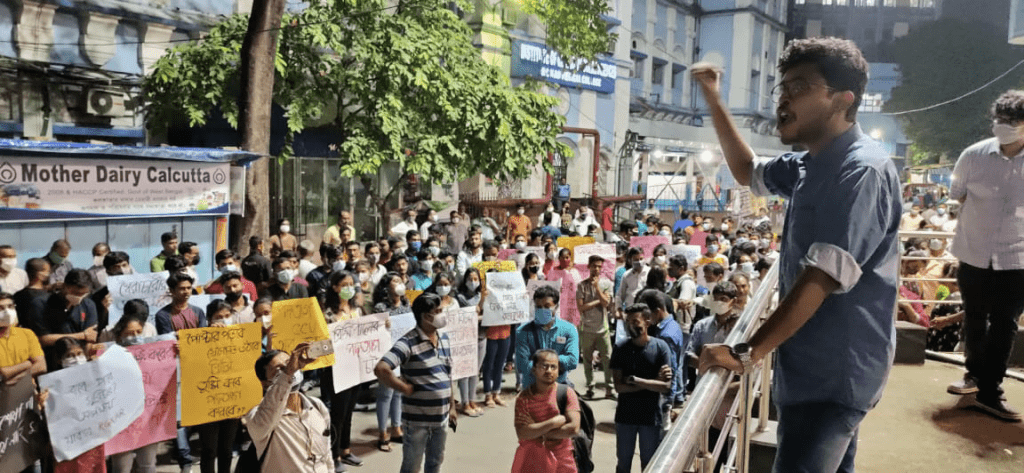NEW DELHI: Protests in West Bengal, ignited by junior doctors, escalate as calls for justice grow louder amid state government inaction in the rape and murder case.
The protests in West Bengal, initially sparked by junior doctors demanding justice, have escalated into a widespread agitation involving people from all walks of life. With civilians leading the movement, the incident has garnered national attention. Earlier last week, even school students took to the streets, demanding justice and safety for women, a pressing concern in a state governed by a female chief minister.
Nearly three weeks have passed, yet the West Bengal government, led by Chief Minister Mamata Banerjee, has taken no concrete action on the rape-and-murder case that took place at RG Kar Medical College and Hospital on 9 August. The incident has raised serious concerns about women’s safety in the state and cast doubt on the effectiveness of the state’s law and order set-up. The situation in Bengal has become so alarming that even the President Droupadi Murmu has expressed her concern. Earlier last week, President Murmu reacted to the brutal crime against the female doctor, declaring “enough is enough.” She called on the nation to challenge the mindset that views women as less capable, and pointed out that this incident is part of a troubling pattern of crimes against women across the country.
Dr Subarna Goswami, Additional General Secretary of the All India Federation of Government Doctors’ Associations, said that the entire country is protesting not just against the horrific incident that occurred on August 9 at RG Kar Medical College, one of Kolkata’s premier medical institutions, but also against the administration for their deliberate attempts to cover up the incident, tamper with evidence, and deny justice. He emphasised that their protest is against these injustices, demanding that all perpetrators be held accountable and punished and that those involved in the cover-up be exposed.
The Sunday Guardian spoke to Balram Bose, an elderly man resembling a monk who participated in the protest. The image of this saffron-clad monk, holding the national flag and urging students to continue with the protests, while he is doused by the police by water cannons, has gone viral and inspired many to take to the streets.
He said, “The protest was called by students, and they asked that one person from each household to join. I have women in my family, and I’m concerned for their safety, so I felt compelled to participate.” Bose added.
“I’m just an ordinary man, like the thousands of others in this movement. My message to the people is to persist in seeking justice, regardless of the narratives being spun.”
He further expressed his resolve by saying, “I was determined that our voice should reach Nabanna (state secretariat), and I was ready to die for that. I even urged the cops to join us.”
Addressing his attire, he stated, “I am a Sanatani, and if being Sanatani is a crime, then I am a criminal. This movement should remain free of political influence; all we seek is justice.”
Bose stated, “The widespread protests in West Bengal reflect deep public frustration with rampant corruption at all levels of government, from top leaders to low-ranking employees. Instead of addressing these issues, the government is accused of shielding wrongdoers and rushing to close high-profile cases by scapegoating minor players. The situation has particularly outraged the people, as crimes against women have been on the rise, and many feel that the police are failing in their duty to protect them.”
Bose highlights that the protests have united people across society, with many feeling a moral obligation to participate, and various groups, including theatre workers and religious organisations, have joined the movement to demand justice.
Group Captain (Dr) MJ Augustine Vinod VSM (Retd), a former fighter pilot of the Indian Air Force who also participated in the protest, said that doctors are life savers, revered by people worldwide as the human embodiment of God.
He emphasised that women, particularly in India, are held in high esteem, especially in Bengal, where they are venerated as Goddess Durga.
“If we cannot protect our daughters and doctors, we have failed as a nation,” he remarked.
Dr Abhishek Mukherjee, a passout student of RG Kar Medical College, who participated in the protest, said that the criminals involved in this incident have yet to be identified, which has been the primary demand since day one. However, given the government’s stance, it seems like a difficult task.
“In an attempt to curb the protest, the government imposed Section 144 just outside the college, preventing us from continuing our demonstration.”
He added that the people of West Bengal, particularly those in Kolkata, have understood the gravity of the situation and have done their best to support the cause.
Dr Mukherjee emphasised that the issue is about justice for all women, not just doctors, and that every working woman should feel safe in her workplace. He criticised the West Bengal government’s excessive force against students and clarified that this is not a political movement.
The protesters seek genuine legal reforms and effective enforcement, not just symbolic measures like the recent restriction on night work. They invite all supporters to join their cause.
Umesh Rai, BJP State Secretary, said that growing public anger against Mamata Banerjee has turned the protest into a widespread people’s movement.
He accused the police and hospital administration of initially attempting to cover up the incident by claiming the woman had committed suicide and restricting the family’s access to her body. As protests grew, these claims were disproven, leading to a loss of public trust in the chief minister and the police. The resulting mass protests, including a Bengal Bandh supported by various groups, were met with heavy-handed measures by the government, which fortified the area around Navan and deployed over 6,000 police officers, including lathi charges against students, in an effort to suppress the movement.

